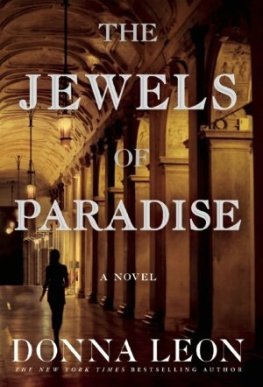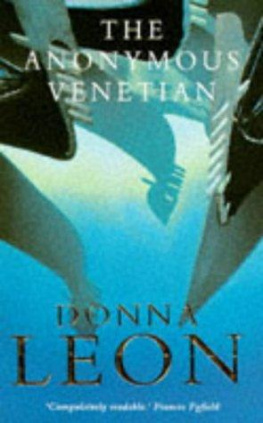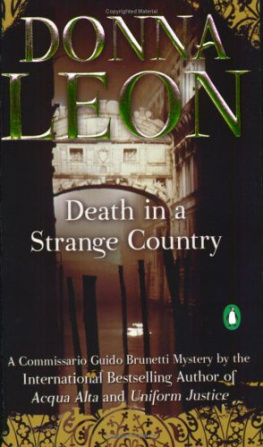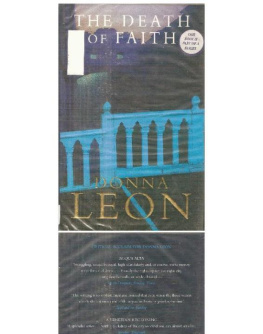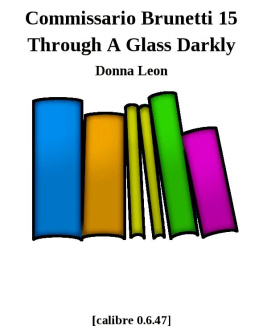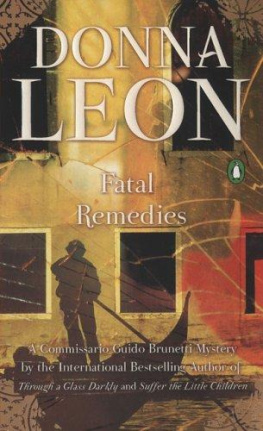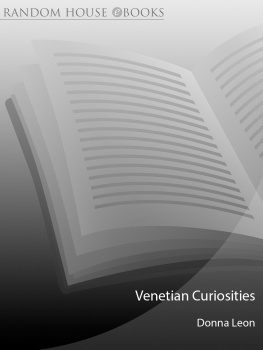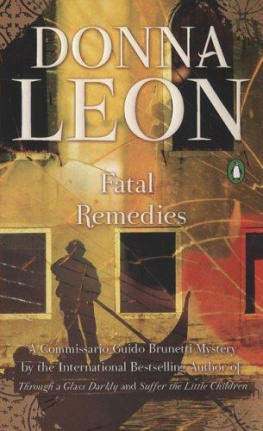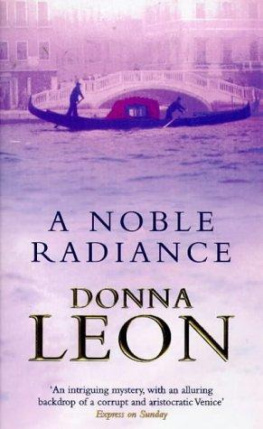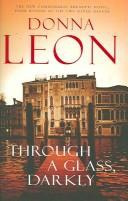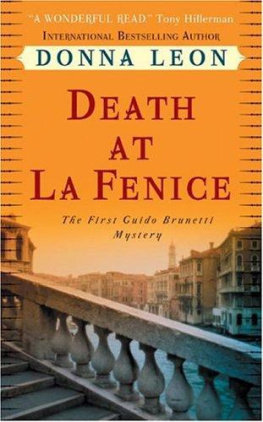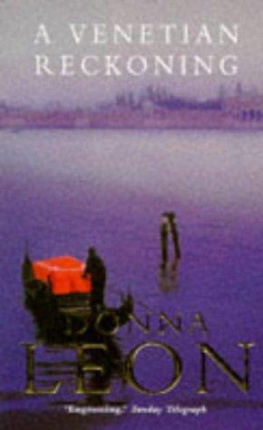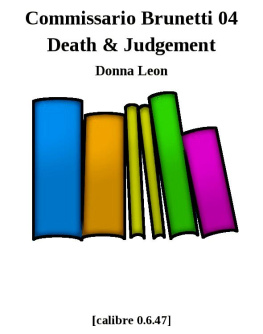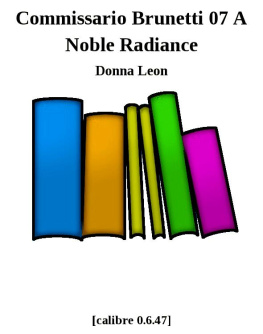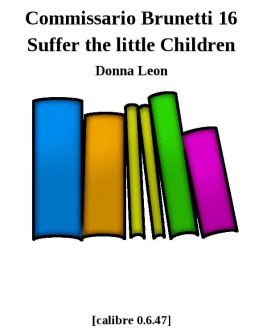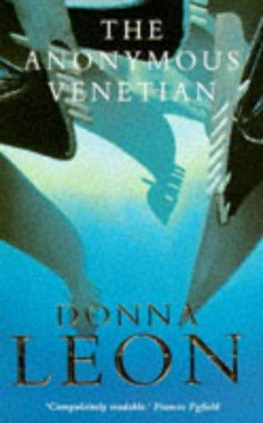The Jewels of Paradise
A novel by Donna Leon
For Markus Wyler
Oh mio fiero Destin, perversa sorte!
Spar mia vita e non mi date a morte.
Oh, my proud Destiny, perverse fate!
To destroy my life, but not give me to death.
Agostino Steffani,
Niobe, Act 2, scene 5
CATERINA PELLEGRINI CLOSED THE DOOR BEHIND HER AND leaned her back and then her head against it. First came the slight trembling of her legs as tension began to relax its hold on her muscles, then the deep breaths that helped relieve the tightness in her chest. The desire to wrap her arms around herself in an expression of wild, uncontrollable glee was almost irresistible, but she beat down that temptation, as she had beaten down many in her life, and stood with her hands at her sides, leaning against the door and telling herself to relax.
It had taken great patience, but she had done it. She had put up with a pair of fools, smiled at their manifestations of cupidity, treated them with the deference they so evidently did not deserve, all the while maneuvering them into giving her the job she wanted and which they held in their gift. They had no wit, but they had the power to decide; they had no grace of spirit, but they could say yes or no. They had little understanding of her qualifications and badly disguised contempt for her learning, but she had needed them to choose her.
And they had, both of them, and not any of the other applicants she had thought ofnot without a wry consciousness of how much her language had been affected by the historical period in which she had spent the last ten years of her academic and professional lifeas her rivals. As the youngest of five sisters, Caterina was endowed with a healthy sense of rivalry. Not unlike characters in a Goldoni play, the sisters were: Claudia the Beautiful; Clara the Happy; Cristina the Religious; Cinzia the Athletic; and, last born, Caterina, the Clever. Claudia and Clara had married fresh out of school; Claudia had divorced within a year and upgraded to a lawyer she seemed not to like very much, while Clara stuck to her first husband and was happy; Cristina had taken vows and renounced the world, then gone on to take advanced degrees in the history of theology; Cinzia had won some medals in diving at the national level but then had married, borne two children, and grown fat.
Caterina, the clever one, had studied at the liceo where her father taught history and had consistently won the yearly prize in Latin and Greek translation while picking up Russian from her aunt. From there she had gone to an ignominious year as a vocal student at the conservatory, then two years studying law at Padova, which disappointed, and then bored, her. The lure of music returned then, and she had chosen to study musicology in Florence and then in Vienna, where her thesis adviser, learning of her fluency in Russian, had arranged a two-year research grant for her to accompany him to Saint Petersburg to help with his research on Paisiellos Russian operas. That concluded, she returned to Vienna and finished a doctorate in Baroque opera, the degree and her possession of it sources of delight and pride to her family. This qualification, after only one year of trying to find a job, had earned her a sort of internal exile to the South in the form of a position as lecturer in counterpoint at the Conservatory of Music Egidio Romualdo Duni in Matera. Egidio Romualdo Duni. What scholar of Baroque opera would not recognize his name? Caterina had always thought of him as Duni Who Also Wrote, the man who had written operas with titles identical to those of more famous or more gifted composers: Bajazet, Catone in Utica, Adriano in Siria. Duni had left as little trace in Caterinas memory as he had on current opera production.
A doctorate from the University of Vienna, and then a job lecturing first-year conservatory students in counterpoint. Duni. There were entire weeks when she thought she might as well have been lecturing in mathematics, so far did this subject seem from the magic thrill of the singing voice. This dissatisfaction did not bode well, something she had known almost as soon as she arrived. But it had taken her two years to decide to leave Italy again, this time by accepting a position at Manchester, one of the best centers in Europe for the study of Baroque music, where she had spent four years as a research fellow and assistant professor.
Manchester had appalled Caterina by its physical ugliness, but she had been content enough at the university, digging into the musicand, to a lesser degree, the livesof a handful of eighteenth-century Italian musicians whose careers had prospered in Germany. Veracini, Handels great rival; Porpora, Farinellis teacher; the practically forgotten Sartorio; Lotti, a Venetian who, it appeared, had been everyones teacher. It was not long before she began to see the similarity between their destiny and her own. In search of the work and fame they had failed to find in Italy, they had immigrated north. Like some of them she had found work, and like most of them she had suffered homesickness and longed for the air, beauty, and possibility of joy offered by a country that, she realized only now, she loved.
Salvation had come, as is so often the case, by chance. Each spring, the wife of the head of her department gave a dinner for her husbands colleagues. The chairman always made it clear that it was a casual thing: come if youre free. Older and wiser heads knew that the invitation had the same weight as a ukase from, say, Ivan the Terrible. Not to go was to cast aside all hope of advancement, though to attend was to sacrifice one evening of life to tedium so encompassing as almost to be fatal. Heated exchange of insult and vituperation, even blows, would have been a source of delight, but the dinner conversation was rigidly governed by caution and a tight-lipped politeness that failed to camouflage decades of rancorous familiarity and professional jealousy.
Caterina, aware of her own incapacity to be bland, avoided conversation and devoted herself to the study of the personal and sartorial peculiarities of her colleagues. Most of the people at the table appeared to be wearing the unwashed clothing of their larger-sized friends. The shoes appalled her. And then there was the food. Though she sometimes discussed the other subjects with Italian colleagues, none of them had the courage to mention the food.
Her savior was a Romanian musicologist who had spent the last three years, so far as Caterina could judge, in an alcoholic stupor: the fact that he was drunk in the morning and drunk in the evening never prevented him, however, from smiling amiably at her when they passed in the corridors or library, a smile she always gladly returned. He was possibly sober and unquestionably brilliant during his classes, where his analysis of the metaphors in the libretti of Metastasio broke new ground, and his explication of the Viennese court poet Apostolo Zenos correspondence concerning the foundation of the Accademia degli Animosi was a source of wonder to his students. He often wore cashmere jackets that fit him very well.
On the night of her salvation, the Romanian was seated across from her at the chairmans dinner, and she found herself smiling back into his wine-dulled eyes if only because they could speak easily in Italian. Most of the other people at the table had learned Italian to facilitate their reading of opera libretti; thus few of her colleagues could hold a conversation in that language without descending into wild declarations of love, terror, remorse, and, upon occasion, bloodlust. Caterina preferred to converse with them in English. While she considered the use of the language of opera libretti as dinner conversation, Caterina studied the people at the table. Revelation occurred: how well a phrase such as,

